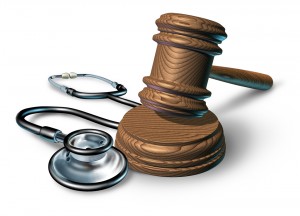 Medical Malpractice
Medical Malpractice
Medical malpractice describes the act of any doctor treating a patient negligently or in any other way wherein the care that a patient receives does not meet medical standards. Medical malpractice is very serious and can result in a patient sustaining life long injuries and even death. There are several types of medical malpractice.
1. Incorrect Diagnosis
An incorrect diagnosis occurs when a doctor fails to correctly identify a condition or disease due to negligence or lack of a thorough examination. Misdiagnosis can happen in any medical setting, but it is particularly common in emergency medicine, where physicians may not give the proper amount of time to patients they are put to the charge of examining. Failure to correctly diagnose a patient is very dangerous, particularly in instances of conditions such as heart attacks which can be fatal if they are not properly recognized and immediately diagnosed. A patient may receive an incorrect diagnoses both in their initial contact with a doctor and in any subsequent follow up appointments.
2. Failure to Treat
Doctors are required to keep patients in their care as long as they must be monitored and treated. If a patient is discharged too early, a doctor may be guilty of failing to adequately treat them. Even if a patient is not prematurely discharged, their physician may have behaved negligently if they are not seen for adequate follow ups and check ups after a procedure or initial visit. Failure to treat also refers to instances where a physician should refer a patient to a specialist for a condition but does not.
3. Surgical Error
In any surgical settings, a number of elements may be uncertain. Patients all respond differently to anesthesia and even very experienced surgeons cannot generally guarantee that their patient will react a certain way to surgery. Surgical error does not necessarily refer to a patient responding aversely to surgery. Rather, it describes a scenario wherein a surgeon or anesthesiologist makes an error. These errors may include incorrect incisions, inadvertent damage to either the organ operated on or any other organ, or incorrect dosage of anesthesia.
4. Prescription Error
Doctors must make sure that they prescribe appropriate drugs to the best of their ability. This means that they must make a diligent effort to be aware of any allergies their patients may have to drugs and be mindful of any interactions that may occur between multiple drugs that are being prescribed to a patient. They must check all available records and be aware of any other prescriptions that a patient has received from other doctors or specialists. Pharmacists must be similarly aware of documented patient allergies and possible interactions. Pharmacists must also fill prescriptions exactly as they are ordered by a doctor. Failure to do so is considered medical malpractice.
5. Childbirth Injury
Negligence during prenatal care or delivery itself can result in lifelong injuries or death for both the child being delivered and the mother. Instances of malpractice can include any time when a doctor fails to properly assess and prepare for a very large child or failure to decide that a cesarean delivery is necessary. Malpractice during prenatal care includes negligence during examination leading to a failure to diagnose severe issues with the child.
Consult with an experienced LA Medical Malpractice Attorney
If you believe that you have been a victim of medical malpractice, you should contact an LA medical malpractice attorney immediately. There is a statute of limitations on medical malpractice cases, meaning that after a certain amount of time you will not be able to seek damages for medical malpractice cases. We at Martin Stanley Law are always available to answer any questions you may have about medical malpractice.